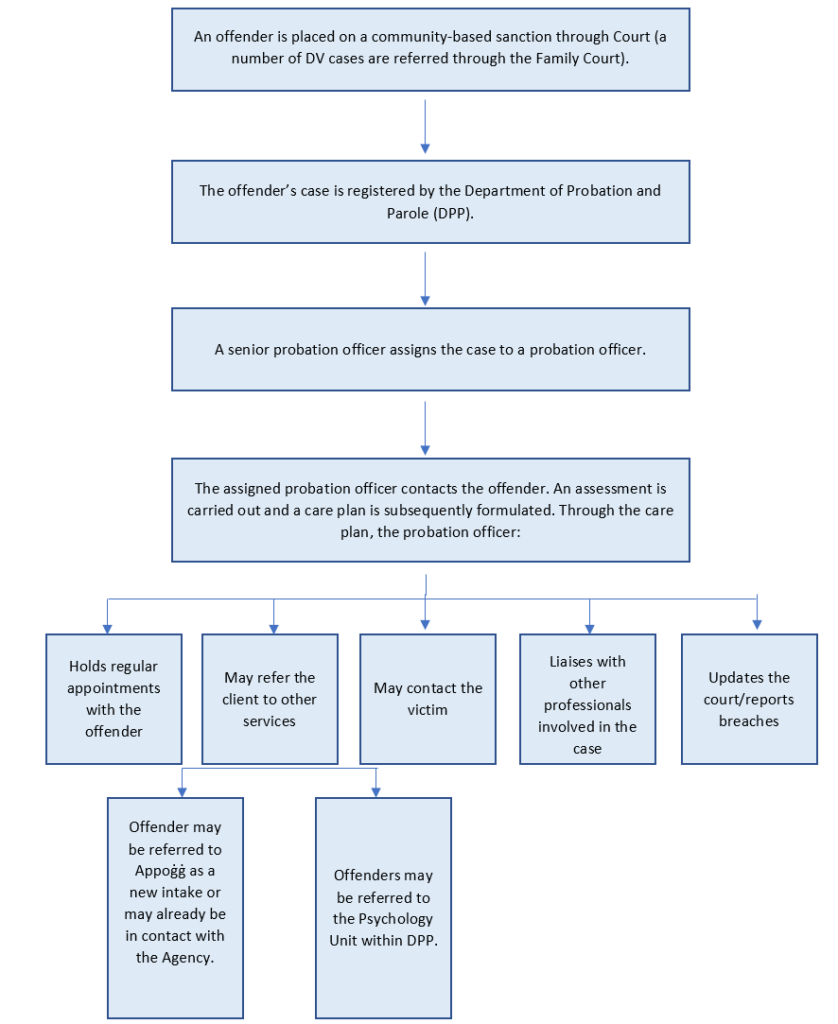Address: Millennia Building, 3rd Floor Aldo Moro Road Marsa, MRS 9065
Telephone: +356 2295 1000
Email: probation.services@gov.mt
The purpose of the Department of Probation and Parole (DPP) is to help ensure social stability by contributing to minimise the frequency of crime and by ensuring the reintegration of offenders to functional societal frameworks. Furthermore, the DPP strives to ensure that the myriad of services offered will address the needs of the criminal justice system.
The probation services are key components of the criminal justice system and work in collaboration with the judiciary, police, various agencies and government departments, among others. Selection of beneficiaries for the service is not dependent on the department. It is the court, the Parole Board and the referral authorities which may refer cases.
The probation services address the needs of adult and juvenile offenders when appointed by the court at the pre-sentencing stage through the pre-sentence report, the social inquiry report and the provisional order of supervision. At the post-sentencing stage, the services offered include the community service order, combination order, probation order, and the suspended sentence supervision order.
The probation services database reveals that offenders come in contact with the probation services for various offences. These offences include:
- Drug possession
- Person offences, such as physical assault and domestic violence
- Sexual offences, such as prostitution and corruption of minors
- Property offences, including illegal entry, auto theft and the defilement of public and private property
- Falsification of documents, money laundering and forgery; and
- Cyber crime
The probation services cater for both male and female offenders, but to date the highest proportion of offenders receiving such services have been males. Through the course of interaction with the offender, the probation officer may also come into contact with the families, employers and immediate peer groups of the offenders subject to the offender’s consent.
The DPP is regulated by the Probation Act (Cap. 446) and the Restorative Justice Act (Cap. 516) where the latter came into force in December 2011. Through these legal instruments, the department provides a selection of services to address the needs of the criminal justice system, which services include:
- Pre-Sentence Report (PSR)
The court may order the compilation of pre-sentence reports, which the probation officer compiles after the offender’s guilt is established and prior to the court making its decision. This report contains extensive information about the offender’s background and present situation. A sentence recommendation is also provided to the court.
- Social Inquiry Reports (SIR)
The probation officer compiles this report as requested by the court at any phase during the criminal proceedings, before guilt is established. This report is similar in content to the PSR but does not include any recommendations to the court regarding sentencing.
- Provisional Supervision Order (PSO)
According to the Probation Act, the court may deem it necessary to issue a provisional order of supervision of the accused by a probation officer at any point during the criminal proceedings.
- Probation Order (PO)
A probation order is issued by the court once guilt is established, with an operational period which can be of a one (1) year minimum period and three (3) years maximum. It is a community-based alternative which aims at helping the offender in his/her rehabilitation, protecting society from harm, and preventing further recidivism.
- Community Service Order (CSO)
Through this sanction the offender is required to perform between forty (40) and four hundred and eighty (480) hours of work without pay. Compensation to the community is regarded as a priority when issuing a CSO, as the offender tries to make up for the harm he has inflicted upon society in general. The offender is expected to carry out the number of hours as stipulated by the Court in his/her free time, whilst the DPP is very careful about such work not to replace paid work.
- Combination Order (CO)
This is an amalgamation of the probation order and the community service order. The probation element may be of one (1) to three (3) years duration, while the community service element between forty (40) and hundred (100) hours.
- Suspended Sentence Supervision Order (SS)
This is a prison sentence which is suspended for a minimum of two (2) and a maximum of four (4) years. The court issues a supervision order applicable to this period. The probation officer supervising a suspended sentence puts more emphasis on the aspect of control.
- Parole Reports & Parole License
An inmate eligible for release on a parole license may file an application for the Parole Board’s consideration. In order to be considered for release on a parole license, the DPP compiles two reports; a report is drafted by the Parole Unit and presented to the Parole Board in accordance with the Restorative Justice Act, as a means to provide an indication of the offender’s level of risk of offending, and determine whether the inmate is prepared to re-enter society on a Parole License and serve the remainder of his/ her prison sentence in the community. Should the Parole Board determine that the applicant may be granted a parole license; the parolee is then supervised by DPP through the assigned parole officers.
Department of Probation and Parole: Flowchart

